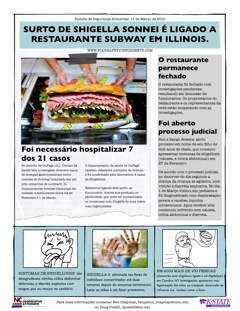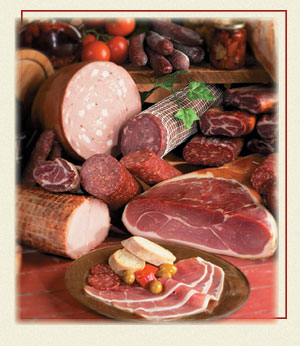Robert Cribb of the Toronto Star is reporting tonight that two Ontarians were hospitalized — and another two deaths are being investigated — in relation to a listeria outbreak traced to a Toronto deli meat manufacturer.
 Its part of a dramatic spike in listeria cases in Ontario since January that has renewed concerns about the country’s food safety system 18 months after 22 Canadians died in the Maple Leaf tragedy (fiasco – dp).
Its part of a dramatic spike in listeria cases in Ontario since January that has renewed concerns about the country’s food safety system 18 months after 22 Canadians died in the Maple Leaf tragedy (fiasco – dp).
Packages of prosciutto cotto cooked ham and mild cacciatore salami made by Siena Foods Ltd. have been targeted as a possible cause in the outbreak.
The company’s salami was recalled in December and the ham was recalled early Friday. Both were sold to delis, grocery stores, specialty food stores and supermarkets after January 11.
“We are using a variety of different methods to … prevent any further exposure to this product by the public,” said
Siena officials did not respond to interview requests Friday.
Since January, the province has had 14 confirmed listeria cases (six in Toronto) — well beyond the eight that is typically expected for this point in the year, said Dr. Arlene King, Ontario’s chief medical officer of health.
Two Torontonians were sickened by a strain of the pathogen that matches with the Siena meat, hospitalized and are now recovering, she said. At least seven people across the province have been hospitalized since January from listeria.
Two Ontarians died during the same time the tainted Siena meat was in the marketplace, she confirmed. But provincial officials are still investigating whether there is a direct connection between those deaths and the company’s products.
Rick Holley, a microbiologist and food safety expert at the University of Manitoba and a consultant with the Canadian Food Inspection Agency (CFIA) said,
“I haven’t seen improvement. We haven’t seen any reduction, in my view, of the risk. We’re not doing foodborne illness surveillance the way we should. I’m not encouraged that, materially, we’ve got the kind of buy-in by industry we need to move forward with confidence.”
 Doug Powell, a Canadian food safety expert at Kansas State University, said,
Doug Powell, a Canadian food safety expert at Kansas State University, said,
“There’s clearly some bad stuff going at that plant. I would like (health officials) to be clear about what they know, what they don’t know and what they’re doing about it. I don’t know how these Canadian health types are allowed to operate the way they do and not say anything.”
Timeline:
December 21, 2009: The CFIA recalls Siera salami
March 3: The ministry began a detailed investigation with local health units to identify source of the illness
March 5: The ministry released an “enhanced surveillance directive” to health units to identify any other cases
March 9: The ministry was notified of the test results of food samples taken from one of the two cases of hospitalized victims. The genetic fingerprint from the prosciutto was an exact match to the salami and a sample taken from one of the infected people.
March 11: The CFIA recalls Siera cooked ham
 The Canadian Food Inspection Agency and Siena Foods warned the public against consuming its cooked ham and some dried meat products after samples tested positive for Listeria monocytogenes in March.
The Canadian Food Inspection Agency and Siena Foods warned the public against consuming its cooked ham and some dried meat products after samples tested positive for Listeria monocytogenes in March.
.jpg) Canada. He was front and center last time. How about the Canadian Food Inspection Agency? What about the Public Health Agency of Canada or Health Canada?
Canada. He was front and center last time. How about the Canadian Food Inspection Agency? What about the Public Health Agency of Canada or Health Canada? Its part of a dramatic spike in listeria cases in Ontario since January that has renewed concerns about the country’s food safety system 18 months after 22 Canadians died in the Maple Leaf tragedy (fiasco – dp).
Its part of a dramatic spike in listeria cases in Ontario since January that has renewed concerns about the country’s food safety system 18 months after 22 Canadians died in the Maple Leaf tragedy (fiasco – dp).